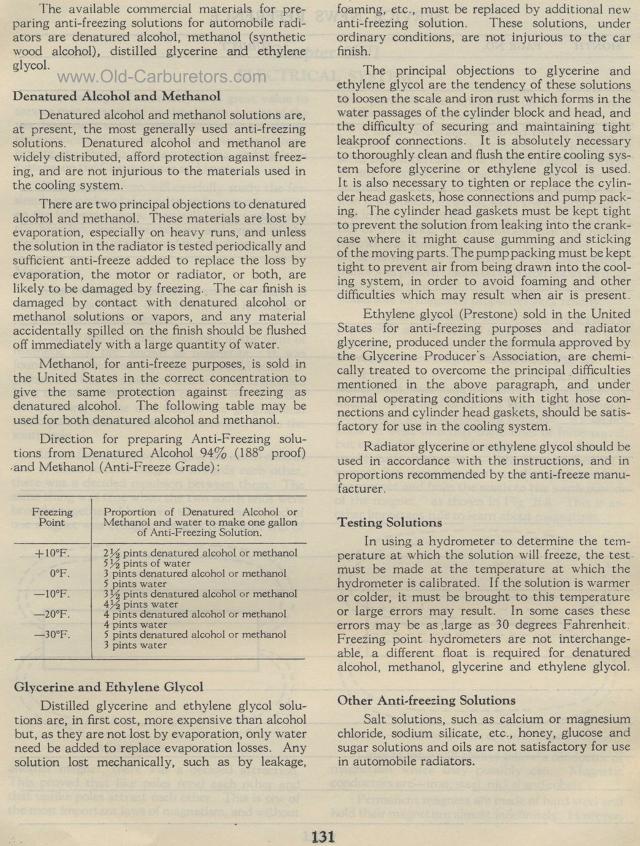The available commercial materials for pre-paring anti-freezing
solutions for automobile radiators are denatured alcohol, methanol
(synthetic wood alcohol), distilled glycerine and ethylene glycol.
Denatured Alcohol and Methanol
Denatured alcohol and methanol solutions are, at
present, the most generally used anti-freezing solutions. Denatured
alcohol and methanol are widely distributed, afford protection
against freezing, and are not injurious to the materials used in
the cooling system.
There are two principal objections to denatured
alcohol and methanol.
These materials are lost by evaporation, especially on heavy runs,
and unless the solution in the radiator is tested periodically
and sufficient anti-freeze added to replace the loss by evaporation,
the motor or radiator, or both, are likely to be damaged by freezing.
The car finish is damaged by contact with denatured alcohol or
methanol solutions or vapors, and any material accidentally spilled
on the finish should be flushed off immediately with a large quantity
of water.
Methanol, for anti-freeze purposes, is sold in the United States
in the correct concentration to give the same protection against
freezing as denatured alcohol. The following table may be used
for both denatured alcohol and methanol.
Direction for preparing Anti-Freezing solutions from Denatured
Alcohol 94% (188° proof) and Methanol (Anti-Freeze Grade) :
Glycerine and Ethylene Glycol
Distilled glycerine and ethylene glycol solutions are, in first
cost, more expensive than alcohol but, as they are not lost by
evaporation, only water need be added to replace evaporation losses.
Any solution lost mechanically, such as by leakage,
foaming, etc., must be replaced by additional new anti-freezing
solution. These solutions, under ordinary conditions, are not injurious
to the car finish.
The principal objections to glycerine and ethylene glycol are the
tendency of these solutions to loosen the scale and iron rust which
forms in the water passages of the cylinder block and head, and
the difficulty of securing and maintaining tight leakproof connections.
It is absolutely necessary to thoroughly clean and flush the entire
cooling system before glycerine or ethylene glycol is used. It
is also necessary to tighten or replace the cylinder head gaskets,
hose connections and pump packing. The cylinder head gaskets
must be kept tight to prevent the solution from leaking into the
crank-case where it might cause gumming and sticking of the moving
parts. The pump packing must be kept tight to prevent air from
being drawn into the cooling system, in order to avoid foaming
and other difficulties which may result when air is present.
Ethylene glycol (Prestone) sold in the United States for anti-freezing
purposes and radiator glycerine, produced under the formula approved
by the Glycerine Producer's Association, are chemically treated
to overcome the principal difficulties mentioned in the above paragraph,
and under normal operating conditions with tight hose connections
and cylinder head gaskets, should be satisfactory for use in the
cooling system.
Radiator glycerine or ethylene glycol should be used in accordance
with the instructions, and in proportions recommended by the anti-freeze
manufacturer.
Testing Solutions
In using a hydrometer to determine the temperature at which the
solution will freeze, the test must be made at the temperature
at which the hydrometer is calibrated. If the solution is warmer
or colder, it must be brought to this temperature or large errors
may result. In some cases these errors may be as ,large as 30 degrees
Fahrenheit. Freezing point hydrometers are not interchange-able,
a different float is required for denatured alcohol, methanol,
glycerine and ethylene glycol.
Other Anti-freezing Solutions
Salt solutions, such as calcium or magnesium chloride, sodium silicate,
etc., honey, glucose and sugar solutions and oils are not satisfactory
for use in automobile radiators.
Proportion of Denatured Alcohol or
Methanol and water to make one gallon
of Ant: Freezing Solution.
2% pints denatured alcohol or methanol 5% pints of water
3 pints denatured alcohol or methanol
5 pints water
3 % pints denatured alcohol or methanol 4% pints water
4 pints denatured alcohol or methanol
4 pints water
5 pints denatured alcohol or methanol 3 pints water
Freezing Point
+10°F.
0°F.
-10°F.
-20°F.
-30°F.
 |
